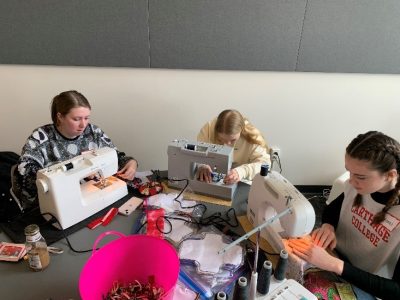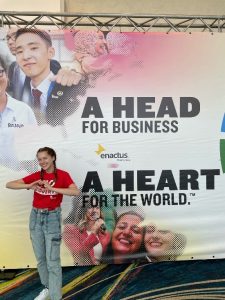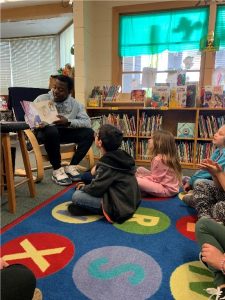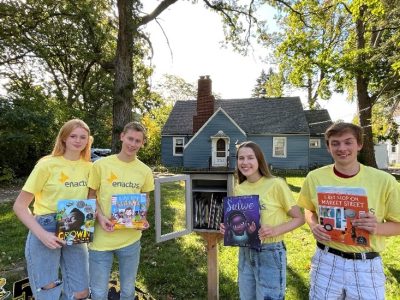Through entrepreneurial action, Enactus students create sustainable solutions to social challenges. Their collective efforts make Enactus a powerful instrument of change to advance progress on the world’s biggest problems. In this blog series, one United Nations Sustainable Development Goal (or SDG)) at a time, we examine how Enactus students are designing, innovating, and pushing boundaries, to create a better world for people, planet, and prosperity.
Is Social Entrepreneurship The Way To End Poverty?
In this interview, Jillian Arbeiter, Enactus President at Carthage College in Kenosha, Wisconsin, United States, shares how she became involved with Enactus and what ultimately led her to conclude that the Enactus model of social entrepreneurship is the superior method to alleviating poverty.

Jillian Arbeiter has been a global citizen with a heart for social good since she was a child. As a young person, she participated in numerous international mission trips. These experiences in part informed her decision to attend Carthage, a university renowned for its travel abroad program, and become involved in numerous campus outreach programs such as Enactus and the Center for Faith and Spirituality’s Food Pantry. Jillian joined Enactus within her second week of college and is currently finishing a two-year term as President. While at Enactus, she founded DiversiReads, a youth literacy program. Jillian recently completed her senior thesis “A Head for Business and a Heart for the World: The Enactus Approach to Poverty Alleviation Through Entrepreneurship.”
Q: What spurred your interest in poverty alleviation?
A: I have seen first-hand some of the poor conditions and setbacks that many people face daily, but also the power entrepreneurship and education can have on changing these circumstances. My senior thesis presented an opportunity for me to explore both of these passions and specifically how poverty alleviation methods can be sustainable and dignified. I focused my research on how Enactus uses the entrepreneurial approach to poverty alleviation and why it has proven to be the most effective.
Q: What are approaches to poverty elimination that you examine in your senior thesis?
A: In my thesis I discuss three of the most common poverty alleviation approaches, those being the charity model, micro-finance approach, and entrepreneurial approach. I detail that while the charity model is often well-intentioned, it often perpetuates the issue of poverty as it creates a cycle of dependency for the receiver. It also doesn’t provide a dignified approach, as those in need of assistance are always taking and with no path to permanent liberation. The micro-finance approach has a lot of overlap with entrepreneurship in that it is a dignified approach, but it is not nearly as sustainable as entrepreneurship. Entrepreneurship presents the best approach because it is both dignified and sustainable, as it offers people suffering from poverty an opportunity to pull themselves out of it, and in many cases permanently. I also detail what makes an Enactus project successful, which revolves primarily around maintaining a profit-generating component to the project, as well as producing large impact numbers, whether that be through targeting one or multiple SDGs.
Q: What are some Enactus social enterprises that have successfully alleviated poverty in a dignified and sustainable manner?
A: BYU’s [Brigham Young University – Hawaii] project RiceUp worked to connect local farmers with consumers to help them start businesses and also taught them farming skills. RiceUp is a play on words that encourages people to rise up out of poverty through rice farming.
Jillian elaborates in her thesis that what makes RiceUp a successful poverty-alleviating social enterprise is that it assists farmers with self-sufficiency and financial independence. The program has impacted the lives of 72,500 farmers, created 945 jobs, and generated an economic impact of $65 million. RiceUp was featured on Hawaii News Now in December 2022.
St. Paul’s University students from Kenya created Eco-Bana Ltd., through which they create disposable hygiene products from banana fibers. They have won the Hult Prize and a lot of other prestigious awards and have produced a lot of profit and global impact.
In her thesis, Jillian writes that the Eco-Bana team “has created a successful social enterprise, partnering with youth, refugees, and entrepreneurs to provide safe and environmentally-conscious menstrual products to those in their communities of Tigoni and Kabuku while also working to lower unemployment rates and close the education gap [and end period poverty].” In December, Kenyan President Ruto requested that the country’s Ministry of Education collaborate with Eco-Bana to make their products available for free in all Kenyan schools.
Q: DiversiReads, the Enactus project that you founded, improves childhood literacy. How does that project contribute toward poverty alleviation?
A: DiversiReads is a project that aims to foster unity and belonging, bridge racial divides, and empower the next generation of leaders. Within this project we host Reading Days at elementary school classrooms and libraries [in Kenosha, Wisconsin, United States] where we visit and read diverse children’s books to the students. We lead a short discussion after and then gift each teacher with a 12-book bundle to keep in their rooms.
By working with children, we are working to attack illiteracy with early intervention. Increased illiteracy shows a pattern of lower income. DiversiReads has a goal of unification and inclusivity within the community in addition to education. We are also working with children on career readiness and college preparation. One of my favorite things about our classroom visits is that there is an opportunity for us to answer the kids’ questions, and a lot of them have taken an interest in higher education [resulting from their interaction with Enactus college students]. One of the classroom teachers recently reached out to me saying, ‘last year when you visited, our students just kept talking about how cool college students were and how they were so excited to go to college now.’
Q: You talk about social entrepreneurship as a superior method for ending poverty because it offers dignity and sustainability. How does your Enactus team’s project Cloth for Change demonstrate that?
A: Cloth for Change is a project that creates and distributes reusable hygiene kits to youth in the developing world to help close the education gap. This project was a branch from the nonprofit organization Days For Girls. We recently changed our name to Cloth For Change to be more inclusive, as not every person who identifies as female has a period and not everyone who has a period identifies as female. Within this project we sew these reusable kits and distribute them to individuals in the developing world through our short-term study abroad trips. We are sending some kits to India this month, actually. We are also working on partnering with local homeless shelters to address this issue locally and are considering selling them to homeless shelters as well to begin generating profit. For individuals who do not have access to these kits, many of them resort to using things like leaves for managing their periods, which often leads to severe infection and causes many health issues. Providing these kits offers both a dignified and healthy alternative.

Q: Through your thesis research and your Enactus projects, what else have you learned about social entrepreneurship and eliminating poverty?
A: I believe it is crucial to begin empowering young people early and prioritizing more entrepreneurial education. Another key takeaway is the importance and effectiveness of dignity and sustainability in poverty alleviation approaches. You can’t have a successful alleviation program without both of these, and with them, individuals and organizations have the power to do a lot of good. Everyone can play a role in aiding these efforts, and with the UN 2030 Agenda completion date rapidly approaching, we need everyone’s help now more than ever. We are currently not on track to meet these goals, but if more people choose to participate in these efforts the right way, we could definitely change that.
Q: Do you have immediate plans following graduation, and will social entrepreneurship play a role?
A: Following my graduation in May, I will be joining Kohl’s in their corporate headquarters full-time in their HR Department. I have been working for them for the past six months and I have loved every minute of it. I am very excited to work in HR as an intrapreneur and to observe how big corporations are also affecting social change through their initiatives and service work. Kohl’s places a strong emphasis on community engagement and service, and within HR specifically, I will be able to play a part in these efforts first-hand.






